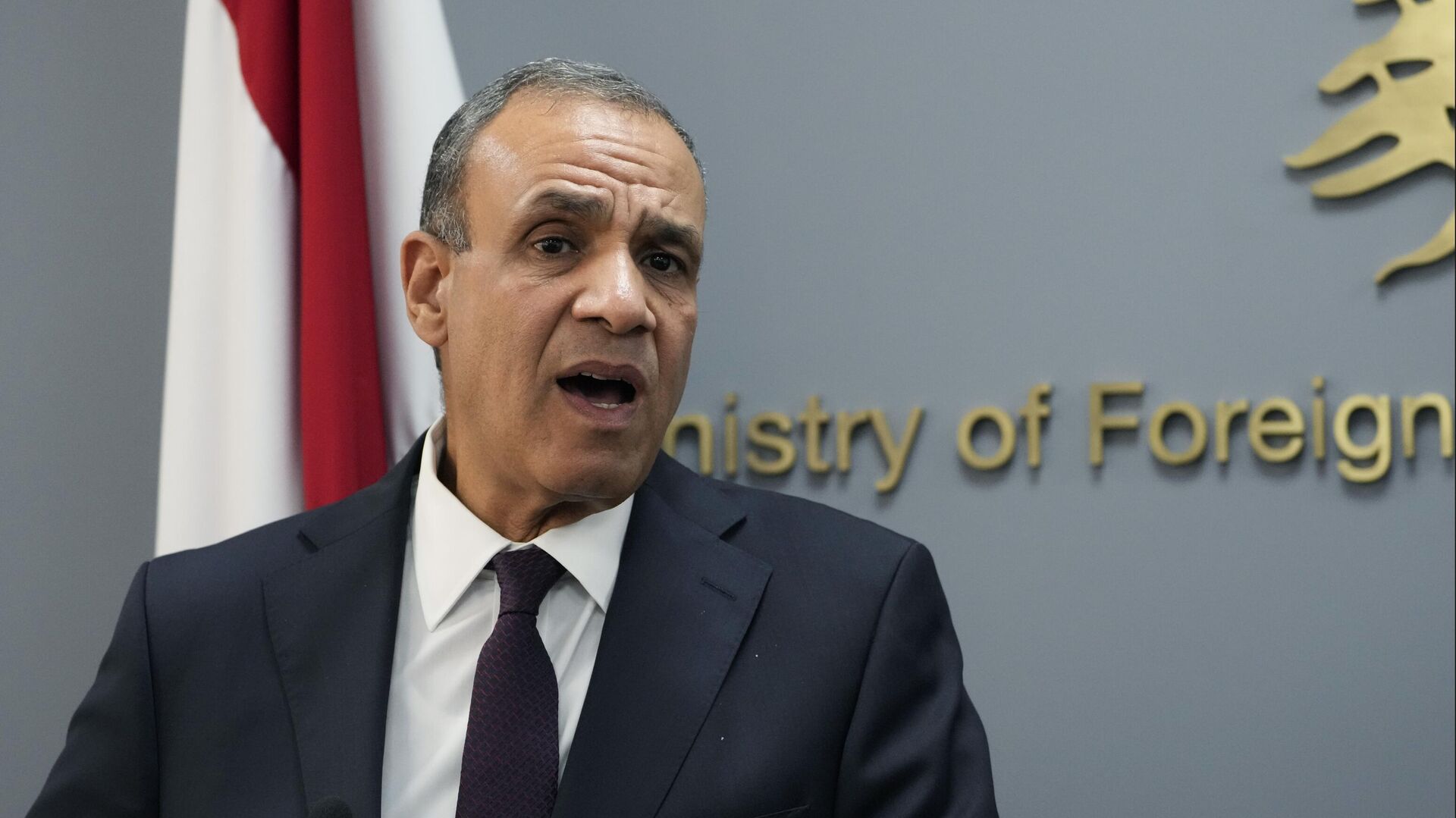https://en.sputniknews.africa/20240901/egypt-formally-requests-un-security-councils-intervention-regarding-grand-ethiopian-renaissance-dam-1068101822.html
Egypt Formally Requests UN Security Council's Intervention Regarding Grand Ethiopian Renaissance Dam
Egypt Formally Requests UN Security Council's Intervention Regarding Grand Ethiopian Renaissance Dam
Sputnik Africa
This comes after Egyptian officials expressed frustration with 12 years of negotiations between Sudan, Egypt, and Ethiopia over the Grand Ethiopian Renaissance... 01.09.2024, Sputnik Africa
2024-09-01T16:37+0200
2024-09-01T16:37+0200
2024-09-03T12:57+0200
egypt
ethiopia
sudan
north africa
east asia
grand ethiopian renaissance dam
negotiations
agreement
water security
water resources
https://cdn1.img.sputniknews.africa/img/07e8/09/01/1068101210_0:0:3104:1745_1920x0_80_0_0_d1dabc92da3abdb1847834a7f8750982.jpg
Egypt has sent a letter to the UN Security Council over the events surrounding the Ethiopian Renaissance Dam, the Egyptian Foreign Ministry said in a statement on Sunday.Abdelatty said that Cairo categorically rejects Ethiopia's approach on the dam and believes that it violates the norms and principles of international law and the agreement signed by Egypt, Sudan, and Ethiopia in 2015.The minister also warned of the dam's potentially severe negative consequences for both Egypt and Sudan, despite recent efforts to mitigate the impact of Ethiopia's unilateral actions.In December 2023, Cairo announced that the trilateral negotiation process on the dam involving Egypt, Sudan, and Ethiopia, which resumed in August of that year and included four rounds, had ended inconclusively.Ethiopia has been implementing the major dam project on the Blue Nile since 2012. While Cairo and Khartoum fear that the filling of the dam and its operation will inevitably lead to water scarcity, Addis Ababa insists that the project is a necessity for its electrification process and development.The three countries have already held more than a dozen consultations to resolve the water sharing issues, but their efforts have remained fruitless. However, Ethiopia proceeded unilaterally and completed four phases of filling the largest hydroelectric power plant in Africa over four years without prior agreements.
https://en.sputniknews.africa/20240828/egypt-reportedly-deploys-military-to-somalia-amid-rising-regional-tensions-1068041580.html
egypt
ethiopia
sudan
north africa
east asia
Sputnik Africa
feedback@sputniknews.com
+74956456601
MIA „Rossiya Segodnya“
2024
Muhammad Nooh Osman
https://cdn1.img.sputniknews.africa/img/07e7/04/0a/1058467512_0:0:1280:1280_100x100_80_0_0_ec723833bcbfcaed2e21952965ad99e4.jpg
Muhammad Nooh Osman
https://cdn1.img.sputniknews.africa/img/07e7/04/0a/1058467512_0:0:1280:1280_100x100_80_0_0_ec723833bcbfcaed2e21952965ad99e4.jpg
News
en_EN
Sputnik Africa
feedback@sputniknews.com
+74956456601
MIA „Rossiya Segodnya“
Sputnik Africa
feedback@sputniknews.com
+74956456601
MIA „Rossiya Segodnya“
Muhammad Nooh Osman
https://cdn1.img.sputniknews.africa/img/07e7/04/0a/1058467512_0:0:1280:1280_100x100_80_0_0_ec723833bcbfcaed2e21952965ad99e4.jpg
egypt, ethiopia, sudan, north africa, east asia, grand ethiopian renaissance dam, negotiations, agreement, water security, water resources, hydropower
egypt, ethiopia, sudan, north africa, east asia, grand ethiopian renaissance dam, negotiations, agreement, water security, water resources, hydropower
Egypt Formally Requests UN Security Council's Intervention Regarding Grand Ethiopian Renaissance Dam
16:37 01.09.2024 (Updated: 12:57 03.09.2024) Muhammad Nooh Osman
Writer/Editor
This comes after Egyptian officials expressed frustration with 12 years of negotiations between Sudan, Egypt, and Ethiopia over the Grand Ethiopian Renaissance Dam, citing the dam's potential risks to water security in downstream Sudan and Egypt during droughts.
Egypt has sent a letter to the UN Security Council over the events surrounding the Ethiopian Renaissance Dam, the Egyptian Foreign Ministry said in a statement on Sunday.
"Foreign Minister Badr Abdelatty sent a letter to the President of the UN Security Council on September 1, following recent statements by the Ethiopian Prime Minister regarding the fifth phase of filling the Renaissance Dam," the ministry said.
Abdelatty said that Cairo categorically rejects Ethiopia's approach on the dam and believes that it violates the norms and principles of international law and the agreement signed by Egypt, Sudan, and Ethiopia in 2015.
The minister also warned of the dam's potentially severe negative consequences for both Egypt and Sudan, despite recent efforts to mitigate the impact of Ethiopia's unilateral actions.
In December 2023, Cairo announced that the trilateral negotiation process on the dam involving Egypt, Sudan, and Ethiopia, which resumed in August of that year and included four rounds, had ended
inconclusively.
Ethiopia has been implementing the major dam project on the Blue Nile since 2012. While Cairo and Khartoum fear that the filling of the dam and its operation will inevitably lead to water scarcity, Addis Ababa insists that the project is a necessity for its
electrification process and development.
The three countries have already held more than a dozen consultations to resolve the water sharing issues, but their efforts have remained fruitless. However, Ethiopia proceeded unilaterally and completed four phases of filling the largest hydroelectric power plant in Africa over four years without prior agreements.



